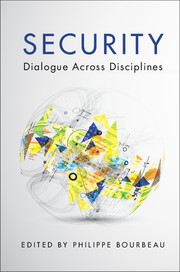Book contents
- Frontmatter
- Contents
- Notes on contributors
- Acknowledgments
- 1 A multidisciplinary dialogue on security
- 2 Philosophy: The concepts of security, fear, liberty, and the state
- 3 Anthropology/ies: Moving beyond disciplinary approaches to security
- 4 Geography: Securing places and spaces of securitization
- 5 Sociology: Security and insecurities
- 6 International relations: Celebrating eclectic dynamism in security studies
- 7 Psychology: The phenomenology of human security
- 8 International political economy: Conceptual affinities and substantive differences with security studies
- 9 Criminology: Reimagining Security
- 10 International law: Between legalism and securitization
- References
- Index
3 - Anthropology/ies: Moving beyond disciplinary approaches to security
Published online by Cambridge University Press: 05 December 2015
- Frontmatter
- Contents
- Notes on contributors
- Acknowledgments
- 1 A multidisciplinary dialogue on security
- 2 Philosophy: The concepts of security, fear, liberty, and the state
- 3 Anthropology/ies: Moving beyond disciplinary approaches to security
- 4 Geography: Securing places and spaces of securitization
- 5 Sociology: Security and insecurities
- 6 International relations: Celebrating eclectic dynamism in security studies
- 7 Psychology: The phenomenology of human security
- 8 International political economy: Conceptual affinities and substantive differences with security studies
- 9 Criminology: Reimagining Security
- 10 International law: Between legalism and securitization
- References
- Index
Summary
As an analytical construct, “security” is either something entirely new to anthropology or a basic element of its disciplinary foundation. Anthropology has in some ways always been concerned with security, understood broadly as the production and maintenance of social order and the management of threats to the general social good. Some of anthropology's earliest disciplinary innovations were framed in terms of social structures and the functions they served, providing for humans’ basic needs while enabling them to deal with uncertainty (in both the natural and supernatural realms) and to ensure the ongoing continuity of their societies (particularly famous ethnographic examples include Evans-Pritchard 1937; Malinowski 1922). Once understood as a consensual, homeostatic mechanism for facilitating human survival amid perpetual challenges, the anthropological concept of “culture” could be seen as one of the earliest interventions in a field that would later be called “security studies.” From this perspective, as Pedersen and Holbraad (2013, 4) observe, “the history of anthropology itself could be rewritten as a story about security.”
On the other hand, anthropological studies of security have only recently begun to proliferate as anthropology, like other disciplines, has ridden the wave of interest in security that emerged in the wake of 9/11. Deploying a contemporary understanding of culture as contested and contingent, and grounded in a historicized, politicized, global perspective, many anthropologists today regard “security” with a critical eye. These anthropologists approach security, as they do other social constructs, with characteristic mistrust. They consider security as part of a larger process of neoliberal social transformation in which states and societies worldwide are engaged. Security is understood as a discourse, a way of perceiving, acting in, and talking about social reality that is not innocent but infused with power and mobilized to serve particular interests. I count myself among those who advance what I have termed a “critical anthropology of security” (Goldstein 2010a), scholars whose ethnographies examine the role that security – as a set of discourses and practices – plays in producing particular kinds of political and legal order in societies around the world.
This chapter explores the diverse and complicated engagement of anthropology with security and its deeply wedded counterpart, insecurity. It examines the elements of anthropology's characteristic approach that have proven to be especially productive for understanding the “cultures of insecurity” (Weldes et al. 1999) that have emerged in recent years, in different societies around the world.
- Type
- Chapter
- Information
- SecurityDialogue across Disciplines, pp. 45 - 61Publisher: Cambridge University PressPrint publication year: 2015
- 2
- Cited by

